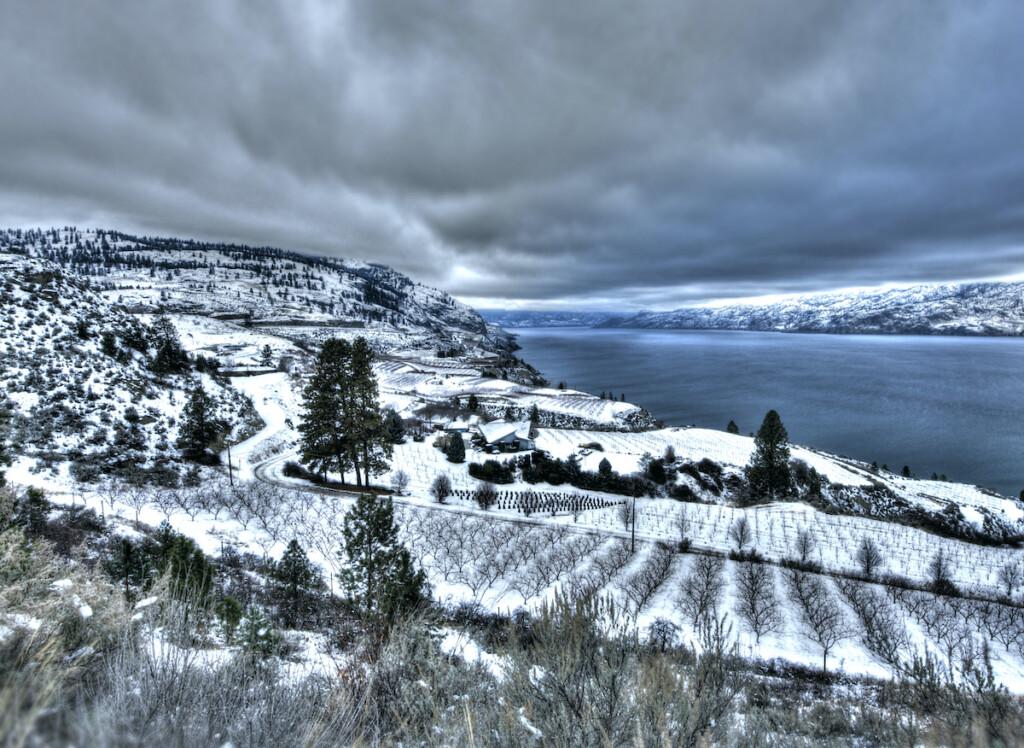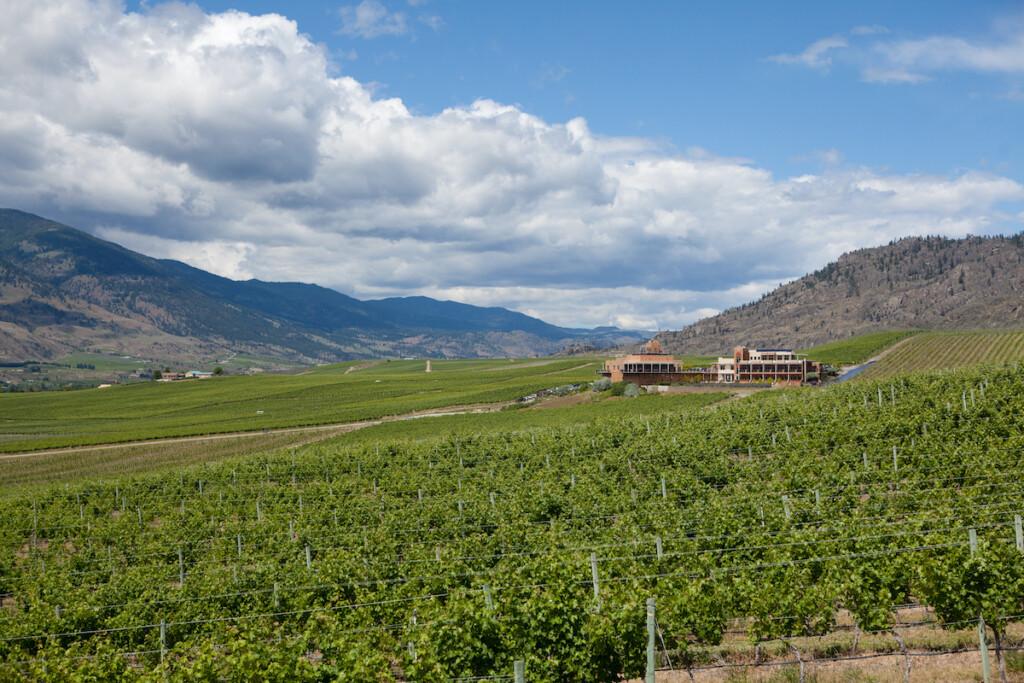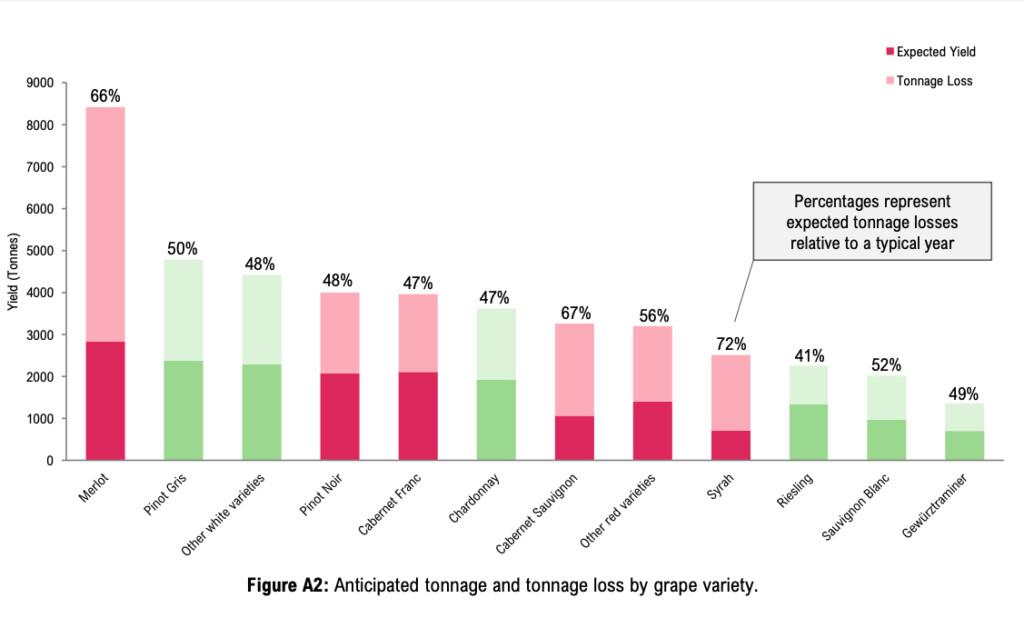
The winter kill that swept through the British Columbia wine industry late in 2022 will result in an estimated crop loss of 54% for the 2023 harvest and prompt the replanting of as much as 29% of the province’s vineyards, according to Wine Growers British Columbia.
Miles Prodan, the group’s President and CEO since 2010, sent an update to membership on Thursday that framed the devastating findings within the Vintage 2023 Damage Report. Estimated costs from the December 2022 damage could reach $145 million, according to the report compiled by Cascadia Strategy Consulting Partners Ltd., in Vancouver, which gathered information from Wine Growers British Columbia members.
The blast of bitter-cold weather on Dec. 22 saw the temperature in the Okanagan Lake city of Kelowna dip to a record of minus 22 Fahrenheit (minus 30 Celsius). That immediately worried winegrowers throughout the province, but fears weren’t realized until bud break for the 2023 vintage.
“Unfortunately, results from our recent stakeholder survey following bud break confirm the earlier projections with the following estimated agricultural impacts,” Prodan wrote.
- 54% reduction in grape and wine production for the 2023 vintage
- 45% of total planted acreage suffering long-term damage
- 29% of total planted acreage needing to be replaced
Nearly everyone responding to the Wine Growers British Columbia survey estimated a crop loss of at least 10% for the 2023 harvest.
Overall, the survey represented 59% of the industry’s production and spanned 12 growing regions. The 330 wineries in the province are fed by 11,086 acres of vineyards. Research indicates the industry contributes $3.75 billion annually to the British Columbia economy and is linked to jobs for 14,272 people.
Estimated economic impacts from the damage include a loss of $133 million in revenue for vineyards and wineries, $100 million in tax revenues on the sale of 100% British Columbia wine and the loss of 20% of the jobs among winery and vineyard workers. That would be about 380 positions.
Christa-Lee McWatters, general manager for TIME Family of Wines in Penticton and Chair of Wine Growers BC, referenced smoke from wildfires, the heat dome of 2021 and less-than-ideal growing seasons in her observations.
“Our industry has taken several devastating hits over the past several years and this freeze event has really compounded the situation,” McWatters said in a news release. “The provincial support programs provided relief for some, however, with the widespread impact of climate change we require concerted government efforts in order to sustain the livelihoods of these important local businesses.”
Fortunately, the late-to-mature “Hail Mary” 2022 vintage that the Pacific Northwest experienced was abundant and acclaimed after a string of three harvests that were deemed as “short” by British Columbia standards.
Charlie Baessler, managing partner at Corcelettes Estate Winery in the Similkameen Valley, said, “For our loyal BC wine fans, we are still hard at work crafting premium wines for you and although this too shall pass, I’d suggest stocking up on your favourite BC producers wine for the next 24 months.”
Freeze damage hammers Merlot, Syrah

Merlot is the most widely grown variety in British Columbia, with about 8,500 tons harvested during an average year. However, the estimated crop loss for that grape from the 2023 vintage is 66%. Those who planted Syrah are projecting a loss of 72%. This time, Cabernet Franc (off 47%) and Pinot Noir (down 48%) proved more winter-hardy.
Not surprising, Riesling was the mainstream variety that best-withstood the winter damage as growers are expecting harvested tons to be off only 41%. For Gewürztraminer, it’s projected to be reduced by 49%. Other notables include Chardonnay (47%), Pinot Gris (50%) and Sauvignon Blanc (52%).
The province’s biggest grape growing region is near the town of Oliver and features the Black Sage Bench. Tonnage there — at least for the 2023 vintage — is projected to be down 61% relative to a typical year. For those growers near the southern end of Okanagan Lake, including the Naramata Bench, the figure is less crippling (29%). The nearby region of Okanagan Falls, between Oliver and Penticton, the estimated loss is 43%. However, in the Similkameen Valley the devastation is forecast to reach 88%. And the young Lillooet wine region west of Kamloops appears to be a total loss.
“The survey responses – cross-referenced with Annual Crop Assessment data from the BC Wine Grape Council – indicate that total grape and wine production for the 2023 vintage will be 54% lower than in a typical year, falling at the upper end of the range estimated by the April 2023 study,” the report stated.
“However, while 98% of respondents cited crop losses of at least 10%, the severity of impact does vary significantly across respondents (with some anticipating a complete write-off of their crop this year).”
“Based on their responses, it is estimated that 45% of the industry’s total planted acreage will suffer long-term damages, and 29% will need to be replaced entirely. The latter will require significant financial investment by businesses and take at least 3 years to reach maturity.”
Total revenues surrounding the production of 100% British Columbia wine are forecast to tumble by 43% — approximately $341 million. That includes tax revenue and sales involving the provincial liquor board, restaurants and retailers.
Role of imports for 2023 vintage, beyond

In recent years, there has been a glut of grapes and wine, particularly among some of Washington state’s largest growers and producers. Now comes the plight of British Columbia winemakers. It is expected that imports from Washington, Oregon and beyond the Pacific Northwest could help to slake the thirst of Canadian wine consumers.
Cascadia Partners brought up the topic of a temporary allowance of non-BC wine for land-based wineries. There are reasons for the mixed opinions.
“Only 45% of respondents support such an allowance, with many citing fears of consumer confusion and difficulty sourcing inputs relative to large national wineries,” according to the report. “As a result, establishing supports to help connect relatively smaller wineries with non-BC grapegrowers may be an important equitable consideration to ensure the program is accessible to wineries of all sizes.”
Such a move would likely help some wineries maintain some shelf space and boost bottle inventories. Provincial government coffers would benefit from the sales of wines that do not fall within the British Columbia Vintners Quality Alliance guidelines.
“While government tax revenues attributable to 100% BC wine products will decrease, total government tax revenues will likely increase due to consumer substitution to non-BC products, which are taxed at a higher rate than BC products,” according to the report.
Pam Alexis, the British Columbia Minister of Agriculture and Food, is scheduled to meet with growers and see the damage within the next two weeks, according to Prodan’s news release. Wine Growers British Columbia also has begun to help members navigate the government’s Production Insurance program.

Leave a Reply